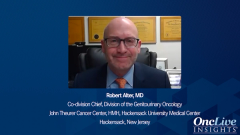
Patient Profile Presentation: A 41-Year-Old Male with Advanced Renal Cell Carcinoma
Sumeet Bhatia, MD, presents the patient profile of a 47-year-old male patient with advanced renal cell carcinoma.
Eric Jonasch, MD: Why don’t we move on to your case now and discuss that in more detail.
Sumeet Bhatia, MD: This is a 47-year-old gentleman whom I saw with a 4-month history of hematuria and right upper quadrant pain in 2014. I specifically put the year because it guides our decision-making. Abdominal imaging at that time showed a 9-centimeter renal mass. He did not have any other evidence of metastatic disease. He underwent a right radical nephrectomy, which showed a T3-N0 clear cell carcinoma. Three years later, he relapsed with the left adrenal mass and had no other metastatic disease. He was resected and 6 months later, he relapsed with another mass, which was 4.8 centimeters in size, and was re-biopsied and confirmed to be recurrent renal cell carcinoma. He was offered resection, but he refused. His calcium was normal, he was anemic, and had thrombocytosis and he did fall into the intermediate-risk category by the algorithm. And since this is 2018, he was started on the ipilimumab [Yervoy] at that point. He tolerated therapy moderately well and after 3 cycles, developed a rash, grade 3 hepatitis, and 2 to 4 loose bowel movements per day. He was treated with hydrosteroids, and they were tapered off over 8 weeks with complete resolution of symptoms. At this time, the scan showed a residual 3-centimeter mass. He was again re-offered resection, but he refused. Four months later, he showed up with a breast mass, which was biopsied and found with kidney cancer. The mass in the abdomen was also larger. At this time, he was treated with cabozantinib [Cabometyx] alone and had been in complete remission until 2 weeks ago, and he was completely asymptomatic. But on the scan showed multiple new liver metastases, pancreatic mass, and again, an EOS [imaging] has confirmed the presence of recurrent renal cell carcinoma. At this time, we’ve started him on tivozanib [Fotivda].
Eric Jonasch, MD: Great case. Really shows the progression of renal cell carcinoma and the choices that we can make. I’m going to very quickly summarize the ipi [ipilimumab]/nivo [nivolumab (Opdivo)] data. This was FDA [Food and Drug Administration] approved in 2018 and was a 1071 patient study of randomized individuals with clear cell renal cell carcinoma, no prior systemic therapy between sunitinib [Sutent] and ipilimumab, nivolumab. And this had coprimary end points of PFS [progression-free survival], subjective response rate, and overall survival [OS]. It met 2 of those 3 end points with a clear overall survival advantage favoringipilimumab/nivolumab. And the primary end point just to be clear was for intermediate- and poor-risk patients. The intent-to-treat analysis still demonstrated advantages from an OS perspective for ipi [ipilimumab]/nivo [nivolumab] treated patients compared to sunitinib treated patients. The objective response rates were 42% vs 26%, so not quite as robust from a numeric perspective in that regard but a CR [complete response] of 10% within the ipi [ipilimumab]/nivo [nivolumab] vs 3% for the sunitinib group. PFS numbers again were not quite as impressive as with the IO [immuno-oncology]/TKI [tyrosine kinase inhibitor] regimens but there’s a tail on the curve both for the PFS and the OS. That’s a little bit more persistent than with the IO/TKI regimens. Higher toxicity, overall, 60% requiring steroids and about a third of patients requiring at least 40 mg of prednisone for some time for the itises that are caused by this regimen. The other thing that we have now is follow-up data that’s beyond 50 months and really showing that these data continue to hold up. It’s definitely interesting and provocative data and makes sense that a lot of this is being used in the community.
Transcript edited for clarity.








































